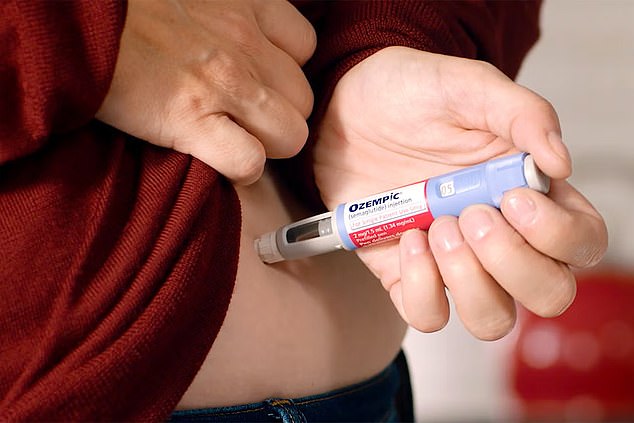Hundreds of people are being hospitalised after suffering serious reactions to weight-loss drugs with numbers surging by 46 per cent in just one month, the Mail on Sunday can reveal.
An investigation has uncovered the latest figures from the medicines regulator, the Medicines and Healthcare products Regulatory Agency (MHRA), which shows nearly 400 people have required hospital treatment – some with life-threatening complications – since the rollout of jabs such as Wegovy, Mounjaro, and Saxenda.
Until October last year, the number of hospitalisations over the six years since the drugs first began to be prescribed stood at 279.
But new data obtained by the MoS has found cases soared over the four weeks to the end of November, with an extra 118 hospitalisations recorded by the MHRA – a rise described by senior doctors as ‘alarming’.
Around half a million Britons are now thought to be using the medication, which can help them lose up to 20 per cent of their bodyweight in just a few months.
The drugs are licensed to treat people who have a BMI of at least 30.
But just five per cent are being prescribed it on the NHS.
It means the majority – which includes people who are not overweight but want to shift a few pounds – are buying it privately, including from online pharmacies and social media.



Most of the reactions are gastrointestinal issues such as persistent nausea, vomiting and diarrhoea, which leave some patients with ‘severe dehydration,’ the MHRA says.
But some doctors warn they are seeing patients with ‘serious, life-threatening complications’ including seizures, bowel obstruction and inflammation of the pancreas, known as pancreatitis.
The reactions are known to be rare side effects of the medication and the figures are likely to be linked, in part, to the escalating numbers of people now taking the drugs.
But experts believe a significant proportion will be patients buying the injections from online pharmacies and taking them without oversight from a doctor.
The MHRA has also warned that a small group of patients have even been hospitalised with ‘hypoglycaemic shock and coma’ – linked to very low blood sugar – after using ‘fake’ weight loss drugs they bought online.
These ‘may have contained insulin rather than [Wegovy and Ozempic’s active ingredient] semaglutide’, the MHRA said, in a warning to health professionals.
The MoS can reveal that, in total, the number of suspected side effects reported to the regulator has also soared by 19 per cent in a month, from nearly 15,000 at the end of October to 17,831 by the end of November.
Last night, Dr Vicky Price, president-elect of the Society for Acute Medicine, said: ‘I and many other colleagues in acute medicine across the UK are very concerned about the increasing numbers of patients we are seeing with complications from new weight loss drugs they have purchased online.
‘We are seeing serious, life-threatening complications including inflammation of the pancreas gland and alterations in blood salt levels in these patients who were not aware of the risk they were taking.
‘Sadly these presentations are not slowing down despite the issue being raised consistently over recent months.
‘We continue to highlight this inappropriate use with the Medicines and Healthcare products Regulatory Agency as there is a need for urgent regulation and control of access for weight loss drugs online to avoid more patients becoming unwell.’
Tory MP Greg Stafford, a member of the Commons’ health and social care committee, said the drugs were a ‘vital tool’ in tackling diabetes and obesity but would ‘only add to NHS waiting lists instead of helping to reduce them’ if misused.
‘We urgently need to tighten the rules around accessing these drugs and make sure doctors are providing better oversight,’ he said.
‘At the same time, we need to improve access to NHS obesity clinics so that people who need this medication can get it safely, alongside the right care.
‘Used properly, these drugs can make a real difference to people’s health, but when misused, they just create more problems for the NHS.’
Katharine Jenner, director of the Obesity Health Alliance, added that the reported reactions ‘raises significant concerns about whether people are accessing [these drugs] in a safe way, and whether they are being supported to take them in the right way’.
The MoS understands Border Force seized 869 ‘fake’ weight loss pens destined for UK consumers during 2023. But that may be just the ‘tip of the iceberg’, experts say.
Some contain relatively harmless substances, but others may contain illegal amphetamines or insulin – which, if taken by people who are not diabetic, can cause such low blood sugar levels that it could leave people in a coma or could even prove fatal.
Last year, nurse Susan McGowan, 58, from North Lanarkshire, died after taking two low-dose injections of Mounjaro which she had bought from an online pharmacy.
Professor David Strain, associate professor in cardiometabolic health at the University of Exeter, who runs a NHS obesity clinic, said: ‘These drugs are a breakthrough for obese patients and they have a good safety profile in clinical trials, but that’s partly because trials come with a full wraparound service.
‘Patients don’t just get the drug and get sent on their way – they get counselling, monitoring, diet and exercise advice, which will mitigate the most common side effects.
‘The problem comes when you get a pen of Wegovy or Mounjaro online and you don’t get any advice with it. The dose might go up automatically over time, and without any doctor’s oversight any problems might escalate.
‘We also have no idea how many fake pens are flooding into the market or how many of those contain insulin which will undoubtedly cause hospitalisations.’
He also warned people who are not overweight or obese against taking the drugs.
‘If you’re already thin, and taking it for cosmetic reasons, the side effects will be amplified and it might cause extreme effects.’
Dr Simon Cork, from Anglia Ruskin University, said it was important that patients ‘access these drugs only through trusted medical professionals, and only with ongoing support and monitoring’.
‘It is vital that regulation is tightened to ensure that these drugs are only prescribed under the right circumstances,’ he said.
‘Whilst the likelihood of developing these conditions is still rare, when scaled up to the numbers who could potentially be prescribed these drugs we could start to see many people experiencing adverse effects from their use.’
A Freedom of Information request by the MoS has found the real figures could be significantly higher than the official totals held by the MHRA.


Eight hospitals in England confirmed they had recorded a total of 71 incidents of patients seeking emergency treatment in A&E after taking the jabs in a single 12-month period between September 2023 and August 2024.
The Royal Wolverhampton NHS Trust said 28 patients noted as taking the jabs had been treated in A&E. Around 33 per cent of people living in the local area are obese, according to recent estimates, one of the highest rates in the country.
East and North Herts NHS Trust recorded 15.
The MHRA has advised health professionals to warn patients that one in ten may experience gastrointestinal effects when their dose is increased.
Last night, Dr Alison Cave, the MHRA’s chief safety officer, said: ‘No new safety concerns have been identified in the current data, and we continue close monitoring of these medicines and will communicate safety updates as necessary.
‘As the use of the [weight loss drugs] increases, so have the number of Yellow Card reports associated with these medicines. It is important to note that Yellow Card reporting rates can be influenced by many factors including increased awareness about a product.’
A Department of Health and Social Care spokesperson said: ‘Obesity is debilitating, costs lives, and burdens the economy as well as the NHS.
‘These obesity drugs can greatly benefit those in real need but these are licensed medicines, not cosmetic drugs; and should only be used by people who are eligible, under medical supervision.
‘Patients need to be honest when providing information to a prescriber so that they receive advice and medicines which are appropriate for them and so that risks can be managed.’




